Related Research Articles
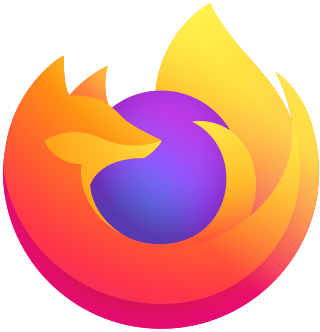
Mozilla Firefox, or simply Firefox, is a free and open-source web browser developed by the Mozilla Foundation and its subsidiary, the Mozilla Corporation. It uses the Gecko rendering engine to display web pages, which implements current and anticipated web standards. Firefox is available for Windows 10 or later versions, macOS, and Linux. Its unofficial ports are available for various Unix and Unix-like operating systems, including FreeBSD, OpenBSD, NetBSD, and other platforms. It is also available for Android and iOS. However, as with all other iOS web browsers, the iOS version uses the WebKit layout engine instead of Gecko due to platform requirements. An optimized version is also available on the Amazon Fire TV as one of the two main browsers available with Amazon's Silk Browser.

Digital rights management (DRM) is the management of legal access to digital content. Various tools or technological protection measures (TPM), such as access control technologies, can restrict the use of proprietary hardware and copyrighted works. DRM technologies govern the use, modification and distribution of copyrighted works and of systems that enforce these policies within devices. DRM technologies include licensing agreements and encryption.

Firefox OS is a discontinued open-source operating system – made for smartphones, tablet computers, smart TVs, and dongles designed by Mozilla and external contributors. It is based on the rendering engine of the Firefox web browser, Gecko, and on the Linux kernel. It was first commercially released in 2013.
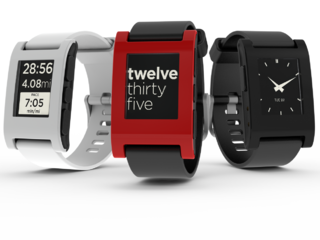
Pebble is a discontinued smartwatch developed by Pebble Technology Corporation. Funding was conducted through a Kickstarter campaign running from April 11, 2012, to May 18, 2012, which raised $10.3 million; it was the most funded project in Kickstarter history, at the time. Pebble began shipping watches to Kickstarter backers in January 2013. Pebble watches can be connected to Android and iOS devices to show notifications and messages. An online app store distributed Pebble-compatible apps from many developers including ESPN, Uber, Runkeeper, and GoPro.

Nexus Q is a digital media player developed by Google. Unveiled at the Google I/O developers' conference on June 27, 2012, the device was expected to be released to the public in the United States shortly thereafter for US$300. The Nexus Q was designed to leverage Google's online media offerings, such as Google Play Music, Google Play Movies & TV, and YouTube, to provide a "shared" experience. Users could stream content from the supported services to a connected television, or speakers connected to an integrated amplifier, using their Android device and the services' respective apps as a remote control for queueing content and controlling playback.
Miracast is a wireless communications standard created by the Wi-Fi Alliance which is designed to transmit video and sound from devices to display receivers. It uses Wi-Fi Direct to create an ad hoc encrypted wireless connection and can roughly be described as "HDMI over Wi-Fi", replacing cables in favor of wireless. Miracast is utilised in many devices and is used or branded under various names by different manufacturers, including Smart View, SmartShare, screen mirroring, Cast, wireless display and screen casting.
Mozilla is a free software community founded in 1998 by members of Netscape. The Mozilla community uses, develops, publishes and supports Mozilla products, thereby promoting exclusively free software and open standards, with only minor exceptions. The community is supported institutionally by the non-profit Mozilla Foundation and its tax-paying subsidiary, the Mozilla Corporation.

Star Citizen is an in-development multiplayer, space trading and combat simulation game. The game is being developed and published by Cloud Imperium Games for Windows. An extended retry of unrealized plans for Freelancer, Star Citizen is led by director Chris Roberts. The game was announced via a private crowdfunding page in September 2012, followed on October 18, 2012 by a successful Kickstarter campaign which drew over US$2 million. Pre-production of the game began in 2010, with production starting in 2011.

Chromecast is a line of digital media players developed by Google. The devices, designed as small dongles, can play Internet-streamed audio-visual content on a high-definition television or home audio system. The user can control playback with a mobile device or personal computer through mobile and web apps that can use the Google Cast protocol, or by issuing commands via Google Assistant; later models introduced an interactive user interface and remote control. Content can be mirrored to video models from the Google Chrome web browser on a personal computer or from the screen of some Android devices.

Amazon Fire TV is a line of digital media players and microconsoles developed by Amazon since 2014. The devices are small network appliances that deliver digital audio and video content streamed via the Internet to a connected high-definition television. They also allow users to access local content and to play video games with the included remote control or another game controller, or by using a mobile app remote control on another device.
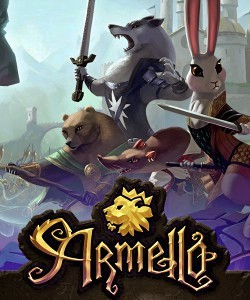
Armello is a 2015 digital role-playing strategy board game developed by League of Geeks. Announced as an iPad title in September 2012, the game has been in development since mid-2011, with music by composers Lisa Gerrard and Michael Allen. Between April and May 2014, a successful Kickstarter campaign was started to help fund a port to Microsoft Windows as well as stretch goals to bring the game to Android and Windows tablets. The game was chosen to receive additional support from governmental funding agencies Screen Australia and Film Victoria.
Encrypted Media Extensions (EME) is a W3C specification for providing a communication channel between web browsers and the Content Decryption Module (CDM) software which implements digital rights management (DRM). This allows the use of HTML video to play back DRM-wrapped content such as streaming video services without the use of heavy third-party media plugins like Adobe Flash or Microsoft Silverlight. The use of a third-party key management system may be required, depending on whether the publisher chooses to scramble the keys.
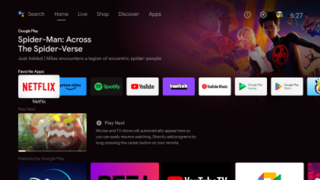
Android TV is a smart TV operating system based on Android and developed by Google. It is available on television sets, soundbars, set-top boxes and digital media players. A successor to Google TV, it features a user interface designed around content discovery and voice search, content aggregation from various media apps and services, and integration with other recent Google technologies such as Assistant, Cast, and Knowledge Graph.
OpenFlint is an open technology used for displaying ("casting") content from one computerized device on the display of another. Usually this would be from a smaller personal device to a device with a larger screen suitable for viewing by multiple spectators.
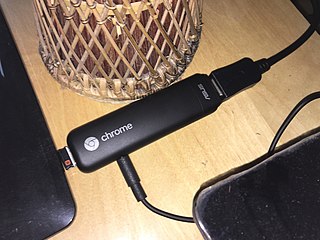
The Chromebit is a stick PC running Google's ChromeOS. It is able to be plugged into any display via HDMI to act as a personal computer. Keyboards and mice are able to be connected over Bluetooth or Wi-Fi. The device was announced in April 2015 and began shipping November 2015.
Console Enterprises is an American technology company headquartered in Chico, California, that focuses on high-performance Android platform design. It is best known for its Console OS Kickstarter campaign, a project intended on developing a native Android distribution for the PC.
Bonaverde was a Berlin-based company known for developing a roast-grind-brew coffeemaker. Founded by Hans Stier in 2013, the company first received widespread notice for its highly successful crowdfunding. Despite significant controversy over its fund raising strategy and lack of communication with crowdfunding contributors, the product received recognition for its combination of coffee and Internet of Things technology, including a Dealerscope 2018 IMPACT Award.

Neptune Computer Inc., commonly known as Neptune, is a Canadian privately held consumer electronics and wearable technology company, founded in 2013 by Simon Tian in Montreal, Quebec, and currently based in Toronto. The company has raised around $7 million from private investors, and over $2 million from crowdfunding sources like Kickstarter and Indiegogo.
EZCast is a line of digital media players, built by Actions Microelectronics, that allows users to mirror media content from smart devices, including mobile devices, personal computers, and project to high-definition televisions.
Firefox Lockwise is a deprecated password manager for the Firefox web browser, as well as the mobile operating systems iOS and Android. On desktop, Lockwise was simply part of Firefox, whereas on iOS and Android it was available as a standalone app.
References
- ↑ Meet matchstick, Mozilla's $25 Chromecast alternative Cnet September 2014.
- ↑ Matchstick to take on Chromecast with a Firefox OS dongle launched on Kickstarter The Next Web September 2014
- ↑ "Matchstick Project". Matchstick. Retrieved October 28, 2014.
- ↑ "Crowdfunded dongle Matchstick sparks backlash with DRM plans". ZDNet . Archived from the original on February 9, 2015.
- ↑ "DRM issues kill off Matchstick Firefox OS dongle as pledges refunded". ZDNet . Archived from the original on August 4, 2015.
- ↑ "Matchstick Delay Announcement". Matchstick. February 6, 2015.
- ↑ A painful decision - we will refund your money Retrieved 3 August 2015.
- ↑ "Open "Chromecast killer" committed suicide-by-DRM". Boing Boing. 4 August 2015.
- ↑ "Comment on Kickstarter project". 2017-08-19. Retrieved 2018-06-18.
- ↑ "Comment on Kickstarter project". 2017-08-14. Retrieved 2018-06-18.
- ↑ "Just a heads up: Matchstick refunds have begun rolling out". 2015-09-01. Retrieved 2018-06-18.
- ↑ "Comment on Kickstarter project update". 2015-03-13. Retrieved 2018-06-18.